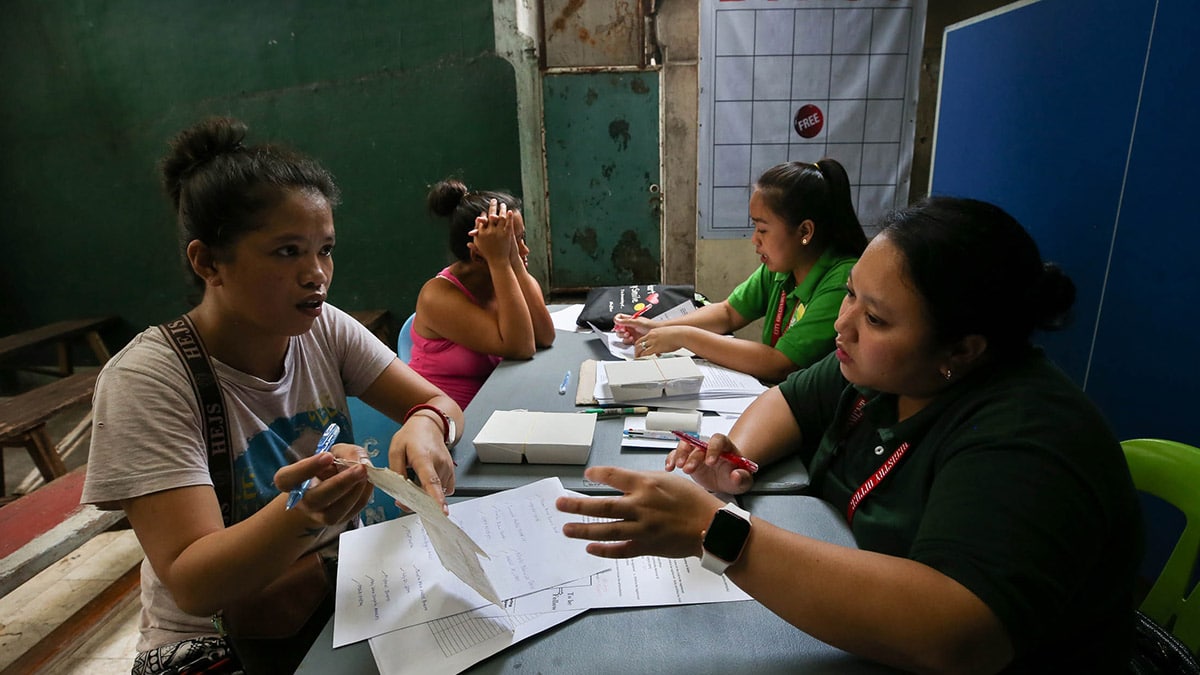
PROOF OF EXISTENCE A woman files an application for late registration of a birth certificate on a relative’s behalf in Navotas City. Philippine Statistics Authority data show that around 3.7 million Filipinos have no birth certificates. —Lyn Rillon
MANILA, Philippines — Eleven-year-old Princess Gabriel, born in Makati City, has no birth certificate, nor do her two other siblings.
Without that official and permanent record proving her existence and legal identity, Gabriel cannot graduate from elementary school. She is also being bullied by schoolmates who tease her for not having a record of her birth.
READ: Culpability in birth certificate mess
“I’m Princess. I don’t have a birth certificate because we’re poor. I need a birth certificate so that I can graduate and have a better life,” Gabriel said when she introduced herself at a media orientation forum on July 12 that tackled a pending House measure on a civil registry and vital statistics (CRVS) system.
The forum was conducted by the Philippine Legislators Committee on Population and Development (PLCPD), a nongovernmental organization affiliated with Congress that includes lawmakers in pushing its advocacy of developing public policies on population and human development.
READ: Gatchalian bares alleged P300,000 fake birth certificate racket
‘Each should be counted’
Gabriel is one of 1.3 million children aged zero to 14 who have no official birth records, according to PLCDP executive director Rom Dongeto.
Citing data from the Philippine Statistics Authority (PSA), he said an estimated total of 3.7 million Filipinos have no birth certificates.
Most are in the Bangsamoro Autonomous Region in Muslim Mindanao, whose five provinces have the lowest proportion of unregistered births in the country.
“To be a part of society means a person will have these milestones in life—birth, marriage, and even death, among others—officially recorded. CRVS systems are designed to ensure that these vital events are continuously and mandatorily documented,” Dongeto said. “Each person has a story. And because people have their stories, each one should matter and be counted.”
He noted that the country—which is highly vulnerable to the increased frequency and severity of disasters and impacts of climate change—needs an efficient and effective CRVS system to match emergency response.
Dongeto cited the lack of information, including misinformation and suspicions about mortality data during Supertyphoon “Yolanda” in 2013, the Marawi siege in 2017 and the COVID-19 pandemic.
Responsive system
Early this year, the House committee on population and family relations approved the Omnibus CRVS bill, a consolidation of measures filed by Speaker Martin Romualdez and Representatives Jude Acidre, Angelica Natasha Co, Ernesto Dionisio Jr., Faustino Dy, Ferdinand Alexander Marcos and Yedda Marie Romualdez. Dy is a member of PLCPD and Co, a trustee.
The bill seeks to establish a comprehensive, responsive, and modern CRVS system. “This bill is very important to us, that every Filipino is recognized and documented, allowing them to have access to crucial services,” Acidre said in the forum.
PSA director for legal services Eliezer Ambatali said an existing organic law, the Civil Registry Law of 1930, needs to be amended because of the many gaps in the country’s civil register.
But new laws have also been enacted since then, such as the Local Government Code, which established the local civil registration offices, and the Philippine Statistical Act, which reorganized the Philippine Statistical System and named the National Statistician the Civil Registrar General.
“Some Filipinos think that PSA is handling the civil registry, but [that falls] under the local governments,” Ambatali said. “We should have a law that requires us [to] institutionalize the awareness of CRVS and to align the system with international standards.”
‘One-step registration’
Public interest group ImagineLaw executive director Sophia Monica San Luis said the Omnibus CRVS bill would address the issues regarding the case of Bamban, Tarlac Mayor Alice Guo, whose Filipino identity has been questioned amid her alleged involvement in illegal Pogo activities.
“A strengthened CRVS system will now have better capacity to address offshore gaming, [in terms of providing] certificates and lawyers, and for [local governments] to be able to do better monitoring,” San Luis said.
At the same time, a “one-step registration” process is being strengthened so that health facilities can help register newborn infants, including providing them with a universal identity code, thereby preventing identity theft, she added.
“The universal identity code is a way to prevent falsified identities,” San Luis said. “What if you indeed grew up in a farm? There is still access to the registration and the PSA will do that without fees and costs even for indigenous peoples and vulnerable sectors.”
‘Cracks in our system’
In a video message, Sen. Risa Hontiveros said the current investigation of the Guo case “has revealed deep cracks in our systems that need correcting. It also exposed the ways our institutions have been corrupted by unscrupulous individuals who want to exploit the weaknesses of our people.”
“A streamlined and strengthened CRVS is needed to safeguard the safety, nationality and citizenship of the most vulnerable Filipinos. Civil registration documents such as a child’s birth certificate establish a person’s legal identity and therefore become a vital source of information for the country’s legislators, policymakers and implementing agencies” she said.